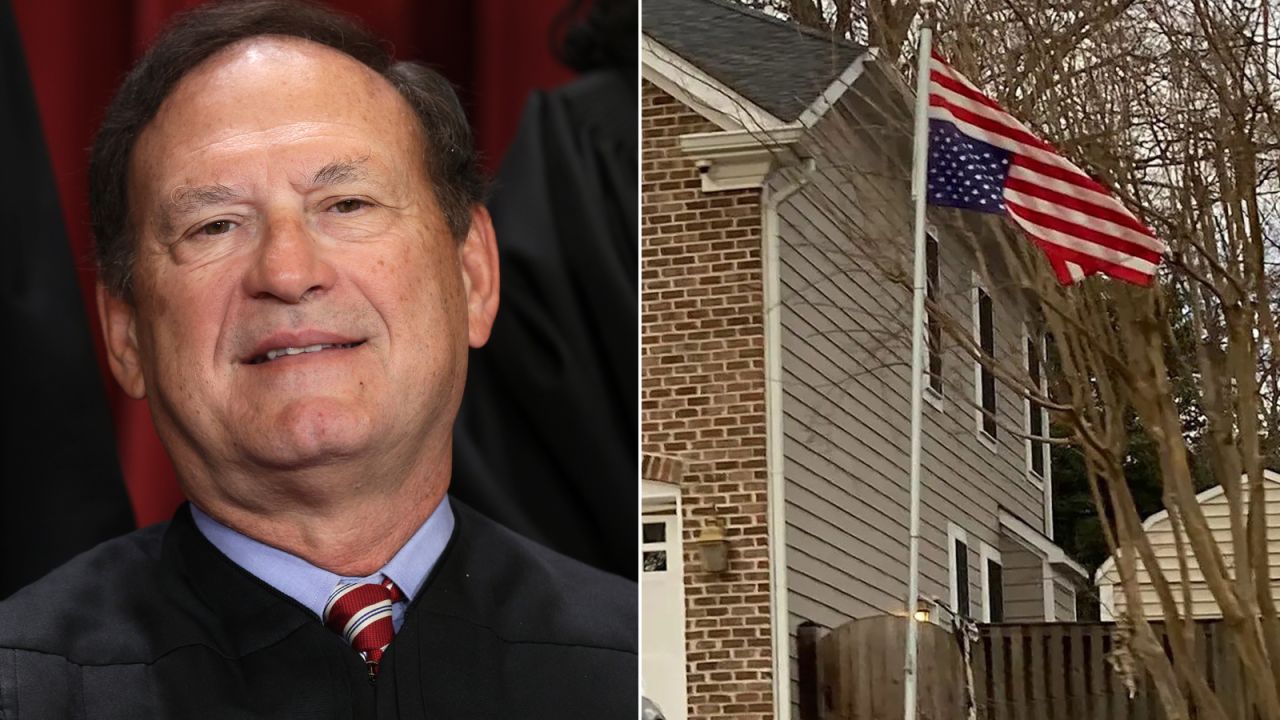Editor’s Note: Julian Zelizer, a CNN political analyst, is a professor of history and public affairs at Princeton University. He is the author and editor of 25 books, including the forthcoming book “Our Nation at Risk: Election Integrity as a National Security Issue.” Follow him on Twitter?@julianzelizer. The views expressed in this commentary are his own. View?more opinion?on CNN.
If Chief Justice John Roberts is really an institutionalist — someone deeply concerned about the integrity of the Supreme Court and public perceptions about it?—?then he has a big problem on his hands.
This week, the news broke that another controversial flag was flown at a home owned by Justice Samuel Alito — in this case, a New Jersey vacation property?— two years after one was flown outside his house in Virginia.
In the first incident, a US flag was flown upside down for several days, in the same way those who falsely claimed that the 2020 election had been “stolen” from former President Donald Trump carried flags at the January 6, 2021 Capitol riot.
On Wednesday, the New York Times, which also first reported the upside-down flag, revealed the presence at Alito’s beach house of an “Appeal to Heaven” flag, which was also used by the “Stop the Steal” movement. The Revolutionary-era flag has been revived in recent years by right-wing activists and politicians.
Although Alito claimed that the first flag was hung by his wife as part of a debate she was having with their neighbor, and that he played no part in it, many have voiced concerns that the display might have been more politically pointed. Alito hasn’t commented on the beach house flag.
The flags raise questions about just how publicly Alito is willing to express his political opinions and how those might influence his legal decisions. The discovery also comes at a time when the Supreme Court will be making a decision about Trump’s claims of sweeping presidential immunity, his get-out-of-jail-free card for the federal cases he faces. It also is considering a case challenging prosecutors’ use of an obstruction law against people arrested on January 6.
The?Alito controversy is not isolated.
The notion that the Supreme Court can be trusted to be an arbiter above partisan politics has suffered?major blows in recent years. The politicization of the Senate confirmation process that has been taking place since the 1960s has gradually made it more difficult for citizens to?see the justices as nonpolitical figures.
Then the consolidation of an extremely conservative 6-3 majority under Trump continued to fuel the perception in blue states that SCOTUS was pursuing a political agenda under the guise of “originalism.” The?2022?Dobbs v. Jackson Women’s Health Organization decision — written by Alito for the majority — that overturned Roe v. Wade appeared to confirm the notion that the court was doing the bidding of conservatives, who had worked for decades to undermine judicial support for abortion rights.?According to one poll taken by the Annenberg Public Policy Center after the decision, 53% of?US adults disapproved of how the court?was doing its job.
Supreme Court decisions have not been the only issue. Investigative reporting about Justice Clarence Thomas’ close ties to a conservative donor who gave him lavish gifts raised many eyebrows, generating questions about whether the justice could be perceived as impartial. There were also stories about his wife, Virginia Thomas, who was involved at high levels in seeking to overturn the 2020 election. Thomas’ critics are furious that he did not recuse himself from the presidential immunity case.?(This is not the first time either. He failed to recuse himself from an earlier case involving the January 6 insurrection despite text messages that revealed his wife’s involvement.)
When news coverage revealed to many voters that SCOTUS is not subject to the same ethics code as judges in other federal courts, pressure increased for Roberts to do something. In November, the court issued a code of conduct, which Democrats have contended lacks a means for enforcement and lets the nine members of the court individually police themselves.
The Alito flag controversy is another blow to the image of the court. Until recently, the Supreme Court had survived the feelings of distrust that had confronted all other US federal political institutions since the Vietnam War and the Watergate scandal,?The recent revelations about the court are a terrible step backwards in the effort to revitalize the government’s standing with the electorate.
According to the Pew Research Center, positive sentiment about SCOTUS has fallen lower than at any time since?they started tracking the numbers in 1987.
Americans need to know that the highest court in the land will not be biased in reaching its decisions, particularly at a time when it is adjudicating cases involving former president and current Republican candidate?Trump,?who has been accused of grossly abusing his power while in office. Trump denies any wrongdoing.
Get our free weekly newsletter
- Sign up for CNN Opinion’s newsletter.
- Join us on Twitter and Facebook
The Supreme Court’s standing in public life isn’t even as strong as it was when Roberts became chief justice in 2005. The court’s reputation had been weakened by the controversial decision that stopped the Florida recount after the 2000 election, handing the presidency to George W. Bush. But the controversy surrounding the court was more limited then.
If Roberts is above all committed to preserving the court’s integrity as an institution,?as many of his supporters believe, then restoring its image has to be a top priority. And Roberts could start by addressing what his colleagues are doing when they are outside the courtroom, making sure that they create a strong firewall between themselves and the deeply polarized political world within which they live.
If Roberts does not act soon, and in bold fashion, SCOTUS will just be one more piece of a fractured world in which people across the political spectrum lack faith in the legitimacy of anything in our public life.



